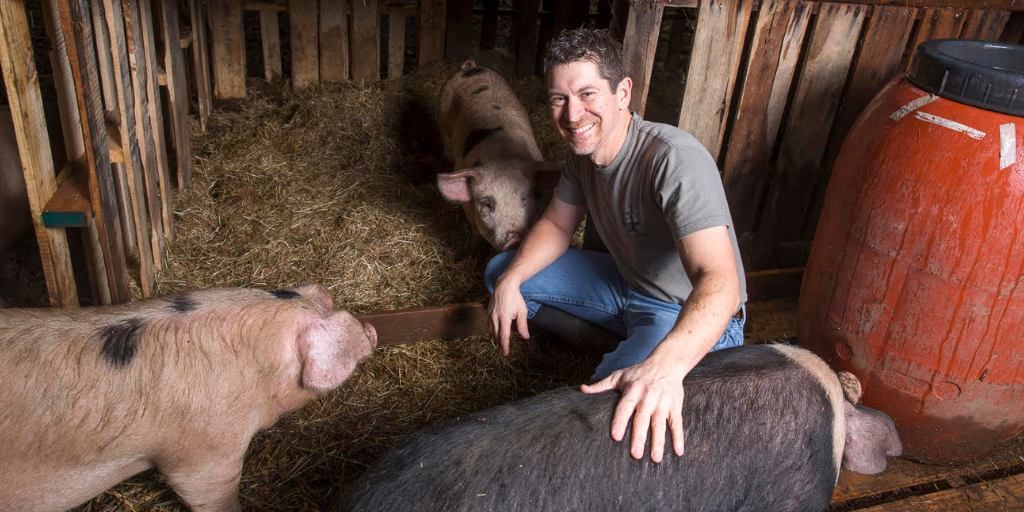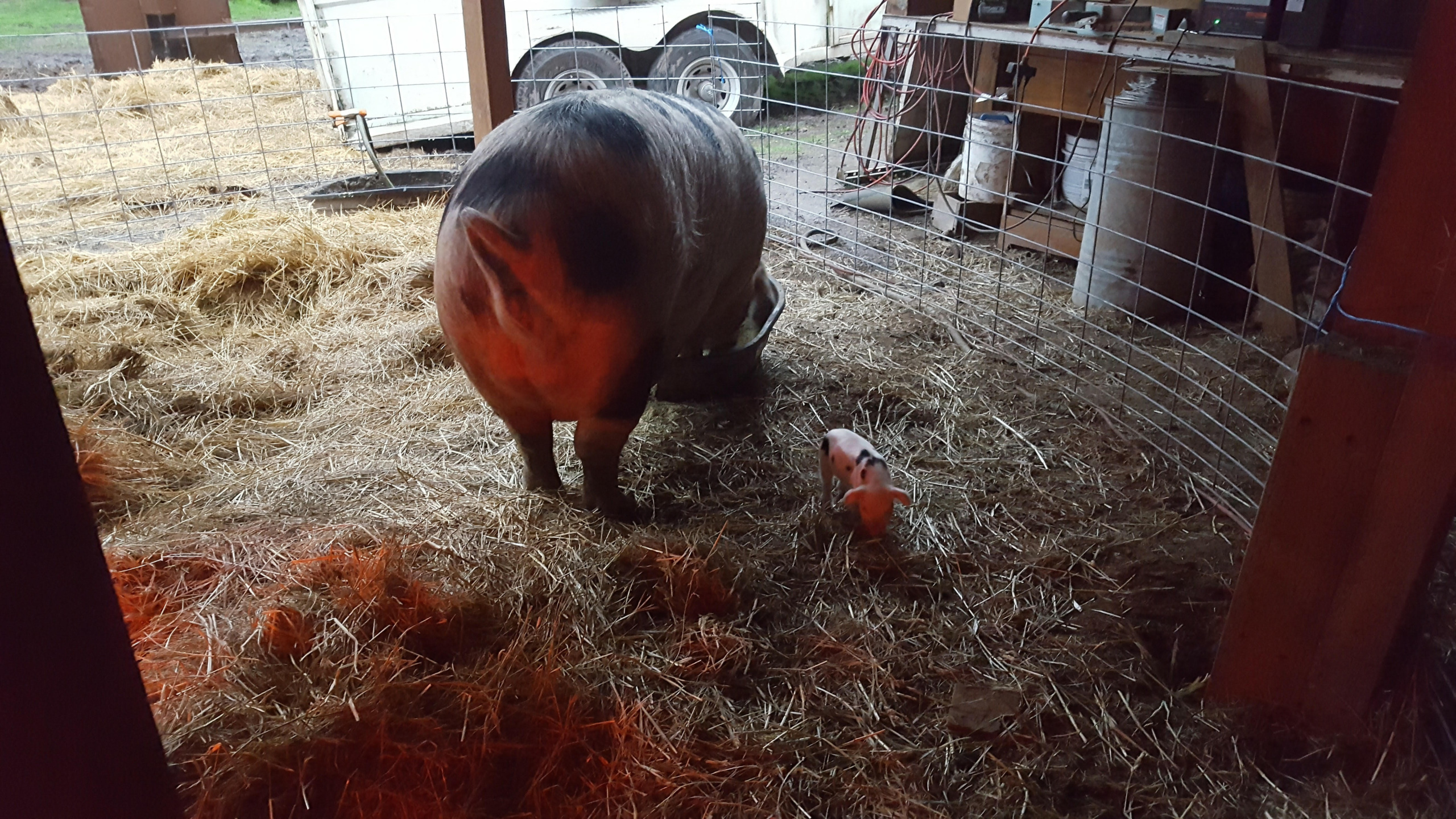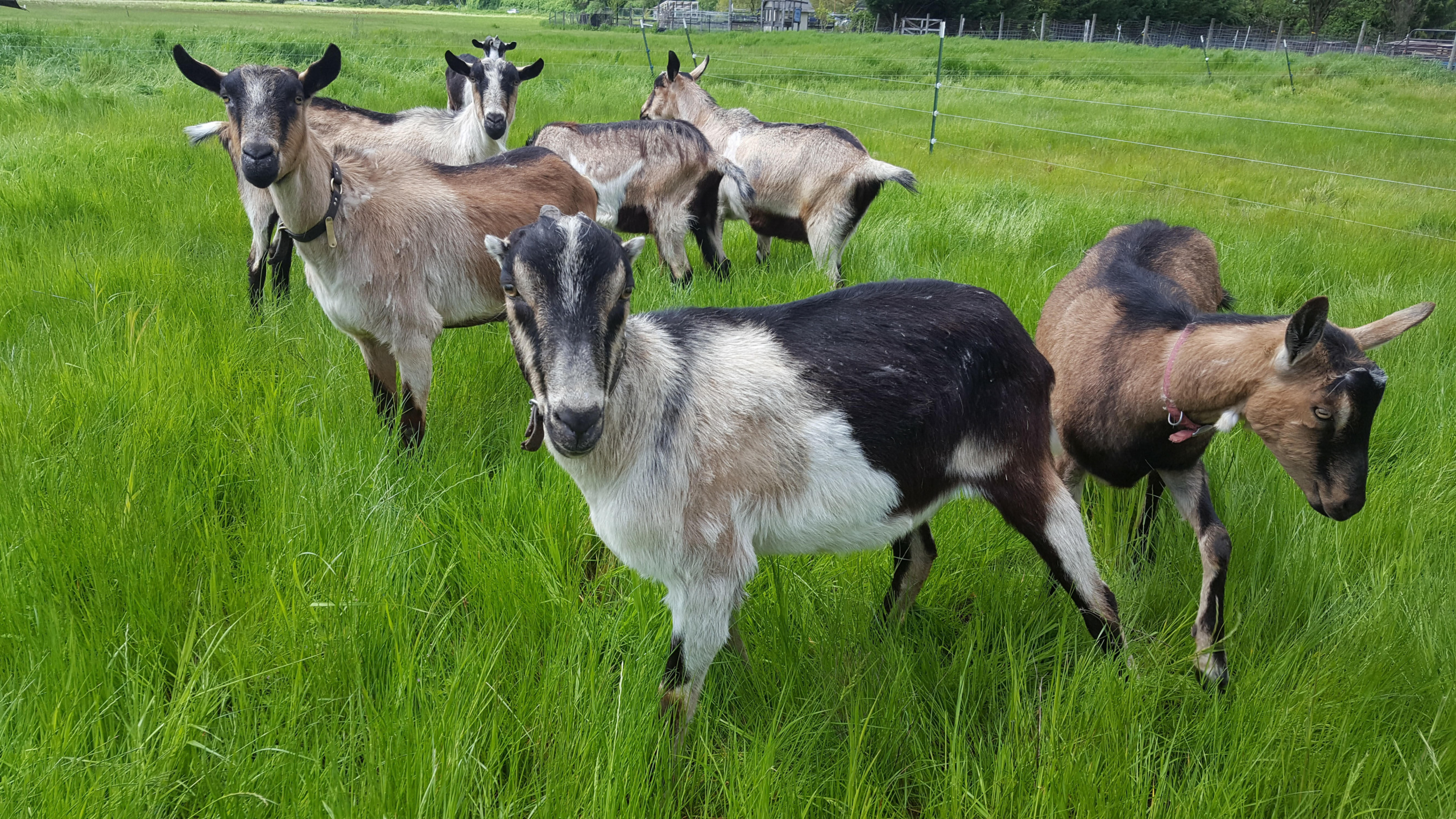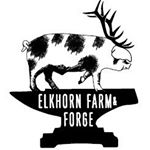
Rising StarMatt Alford of Elkhorn Farm & Forge Will Fight a Goat for Sustainability
How far would you go to run and support your business? Matt Alford has gotten into wrestling matches with goats, face-offs with roosters, and fled from a charging sow all in the pursuit of running his startup. Matt owns an operates Elkhorn Farm & Forge, a farm that ethically raises gourmet pasture pork that operates for the benefit of both pigs and people.
Read more from Matt below:

The spark that inspired the birth of your concept: I run Elkhorn Farm & Forge LLC. The genesis really occurred way back in 1997 after reading the book, Diet for a New America, exposing the horrors of industrial farming practices. After reading that book, I quit eating commercial meat and learned how to hunt my food instead. Hunting turned into an obsession and eventually I raised a herd of packgoats to carry my camp into the backcountry and help me carry the meat back out to the truck. I learned a lot about raising livestock from having goats and eventually raised a few pigs on pasture. Feedback from friends and customers was overwhelmingly positive on the quality of the pork and I went from raising a few pigs to having it become my full-time job. Around that same time, I was taking blacksmithing classes and learning the trade. I combined farming and my passion for metalwork into one business.
The problem it solves: The farm side of the business fills a gap in the market for humanely and ethically-raised pork. Whole Foods and New Seasons have stricter rules than most grocers when it comes to animal welfare, but in my opinion, they still don’t go far enough. There is a consumer segment that wants to be 100% sure that the meat they eat was raised with the best care and best feed. I fill that niche.
How you came up with the name: Hunting and wildlife conservation is a passion of mine. I’ve donated hundreds of hours of volunteer time and thousands of dollars to wildlife conservation. That’s the Elkhorn part of the name. I wanted my business to continue to give back to the wildlife and wild places that make Oregon such a great place to live. I combined Elkhorn with Farm and Forge to represent the three pillars of what the business is about.
How you are different than your competition: My farm has a “pigs first” philosophy, ahead of making money. I’ve lost a lot of money running my business this way, but I won’t compromise animal welfare or pork quality for profit. If I can’t make it work doing it this way, I won’t do it at all. The end result of focusing on pig happiness and quality is that it leads directly to superior flavor. Pork flavor directly reflects the diet that pigs eat and the stress (or lack thereof) of their environment. The #1 expense in raising pigs is the cost of the feed, so most farmers cut corners and feed industrial castoffs such as expired muffins from Costco, which they’re able to obtain for free. I never do that. If their diet consists of junk food, then the pork fat can turn a yellowish color and taste awful. Nobody wants that.
How you make money: I sell pork directly to consumers through my website, newsletter, and various events such as open farm days and wine tastings.
The best thing about being an entrepreneur: What I like best about being an entrepreneur is the freedom to do what I think should be done without having to compromise or get approval from someone who isn’t aligned with my values.
The biggest surprise in your entrepreneurial experience to date: There have been so many surprises that it’s hard to pick just one. I guess the biggest surprise was how difficult it is to raise livestock in the winter. It’s one thing to raise a few heads of any livestock, but it’s a whole different problem when you scale up to 95 pigs and the rain just never ends.
Your biggest success: I’m really glad that I’ve stuck to my “pigs first” philosophy and not strayed from it. Raising livestock puts a severe mental strain on farmers. We’re responsible for the animals’ care, their mental and physical health, and ultimately how and when they die. Pigs give their lives so we can eat and I take some comfort in knowing that I gave them the best life possible while they were here.

A failure story and what you learned: I made the mistake of scaling too fast and at the wrong time of year. Pork sales are heavily seasonal and I underestimated the sales cliff that happens in the first quarter. I didn’t understand the market as well as I should have before making such a big investment. I should have talked to more pig farmers about my plan before jumping in full-time.
What keeps you up at night: Bad weather impacting the pigs has kept me up more nights than anything else. Are they warm? Are they dry? Are the babies okay? When a big storm rolls in at night, I wake up with a PTSD reaction and have to get out of bed and go check on my pigs.
The best entrepreneurial advice you have received: A senior executive once told me, “watch the strategic planning people carefully; they’ll sink your business.” Strategy trumps execution every time. No matter how well you execute a bad strategy, it will fail in the end.
Your #1 piece of advice for a budding entrepreneur: Work your business plan backward from the retail price of your product. It doesn’t matter if you’re selling pig feed, shoes, or financial services, there is a price ceiling for your product and you have to figure out what it is. Once you know the price and who will pay it, then work backward to figure out product costs, breakeven volume, and the cost of scaling to get to that volume. You have to understand the scope of the scale problem in order to fully grasp the amount of investment cash you need. You don’t want to invest years of your life plus your whole life savings only to find out later that it wasn’t enough investment to reach a profitable scale. Scaling requires cash and lots of it.
The #1 book you would recommend for a budding entrepreneur: How to get punched in the face every day and still run your business. All joking aside, I wish a book like this existed and if it does, I haven’t found it. Most entrepreneurship books focus on components of the business plan. That’s fine, but entrepreneurship is about survival. More than anything else, I think survival is about being clear why you’re doing what you’re doing. When the engineers are arguing about whether to implement feature A or B, when you wake up at 2:00 am feeling like you’re going to throw up because you’re not sure if you should borrow more money, when you have to recall your product and start writing refund checks, the thing that will keep you going is being crystal clear on the mission and why you’re in this dogfight. Write it down and look at it every time your business gets punched in the mouth.
The song that best describes your entrepreneurial journey: Highway to Hell.
What wild success looks like: A wild success for my farm would be a business that runs at a GAP Level-5+ in terms of animal welfare, has steady demand from customers who pay on time, and the business is ecologically sustainable, consistently turns a 10% profit, and pays a living wage to everyone in the company. That may sound like a low bar, but there are very few hog farms that meet these criteria today.

Your favorite local business: My favorite local business is Ayers Creek Farm. Owners Carol and Anthony Boutard organically grow fruits and vegetables with superior flavor. Every year they taste their crops and save only the seeds from those plants that produced the very best flavor profiles. They take care of the land, pay their employees well, and role model what a sustainable farm should be.
What did you want to be when you grew up? First I wanted to be a fireman, then an inventor. I thought Thomas Edison and his relentless pursuit of innovation was amazing.
Is Oregon is a good place to start a business? That’s a hard question to answer. I think the State of Oregon makes it easy to start a business, but sometimes not so easy to operate the business. As one example, when the minimum wage was increased a few years ago, there wasn’t an exception for young adults. I do believe that the minimum wage should be high enough to provide a living wage for adults, but kids live with their parents and don’t need $12/hr. Part of the mission of my farm is to give local kids work experience and hands-on exposure to farming. The downside is, kids typically haven’t formed good work habits and aren’t very productive. For $12/hr, I can hire an adult who already has experience and good work habits, so the higher minimum wage actually discourages me from hiring kids. Add in the required BOLI paperwork that must be submitted and approved before a young adult is hired plus workman’s comp insurance and it’s a recipe for kids being left out of the labor market.
In terms of agriculture, Oregon can’t quite decide if it’s pro-ag or not. The fight over land use, especially in the Willamette Valley, is maddening. Farms can conduct wine tastings and popup dinners in a barn, but they aren’t allowed to rent out the same barn for weddings. Farmers who want to add solar panels to their pasture face county officials who bicker over the visual aesthetics and approve or deny permits based on their personal opinions. We need a state-inspected meat program, so farms like mine that don’t want to subject livestock to the stresses of transportation can still sell the meat to restaurants and grocery stores. I don’t feel like Oregon is an easy place to earn a living as a farmer, but it’s pretty easy to give it a shot if that’s what you want to do.
Fun Fact: If you have dreams of owning livestock someday, know this: all animals have a pecking order and you, as a human, have to earn your place at the top. I’ve had wrestling matches with goats, face-offs with roosters, and fled for my life from a charging sow. Goats and pigs have the emotional intelligence of a three-year-old human child; they know what you want and choose to do something else. Fences are merely suggestions. Everything on the farm gets used as a scratching post until it finally disintegrates on the least convenient day of the year. I got into a fistfight with a goat on my birthday; he started it. I don’t know who is in charge of this farm, but it clearly isn’t me.
Elkhorn Farm & Forge LLC: https://elkhornff.com/

